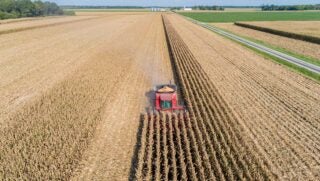Minnesota will implement a new biodiesel standard next spring that will add an average of 63 cents to the market price of a bushel of soybeans. The new 20 percent biodiesel blend (B20) at pumps across the state builds on Minnesota’s national leadership – in 2005, Minnesota became the first state in the nation to require all diesel fuel to have a blend of at least 2 percent biodiesel, known as B2.
“Minnesota has long been a national leader in adding value to our farm products and encouraging renewable energy,” said Governor Mark Dayton. “The biodiesel industry will add an average of 63 cents to the market price of a bushel of soybeans for Minnesota farmers, while reducing approximately 1 million tons of CO₂ emissions next year under this new standard.”
Beginning in May 2018, B20 will be sold at filling stations across the state during summer months, when higher biodiesel blends can be used reliably. In October, the biodiesel blend will drop back to B5 to ensure cold-weather reliability. Beginning in 2019, B20 will be available from April through September every year.
“Implementing the B20 mandate is the culminating step in Minnesota’s commitment to biodiesel and renewable fuels,” said Minnesota Agriculture Commissioner Dave Frederickson. “Since 2005 we’ve been the leader in growing the biodiesel industry nationwide, and it has resulted in added value to our agricultural sector and has improved our air quality.”
A large portion of Minnesota’s biodiesel is made from homegrown soybeans, which are one of the state’s leading cash crops. The Minnesota biodiesel industry annually contributes more than $1.7 billion to the economy. The state currently has three biodiesel plants located in Albert Lea, Brewster, and Isanti, which combined, produce about 74 million gallons of biodiesel annually.
“B20 will help keep Minnesota at the forefront of the homegrown clean energy revolution that is expanding economic opportunities for the state’s farmers and rural communities while reducing pollution and improving air quality for everyone,” said Minnesota Commerce Commissioner Mike Rothman, whose agency tests fuel quality and ensures that service stations comply with the state’s biodiesel mandate.
According to the American Lung Association in Minnesota, the use of biodiesel significantly reduces tail pipe emissions. B20 is expected to reduce 130 tons of particulate emissions and approximately 1 million tons of CO₂ next year.
“Increasing the share of biodiesel in Minnesota is projected to reduce particulate emissions by 130 tons next year,” said Minnesota Pollution Control Commissioner Stine. “Increasing biofuels will help protect and preserve Minnesota’s air and water quality for generations to come, reduces our reliance on fossil fuels, all while supporting Minnesota farmers.”


